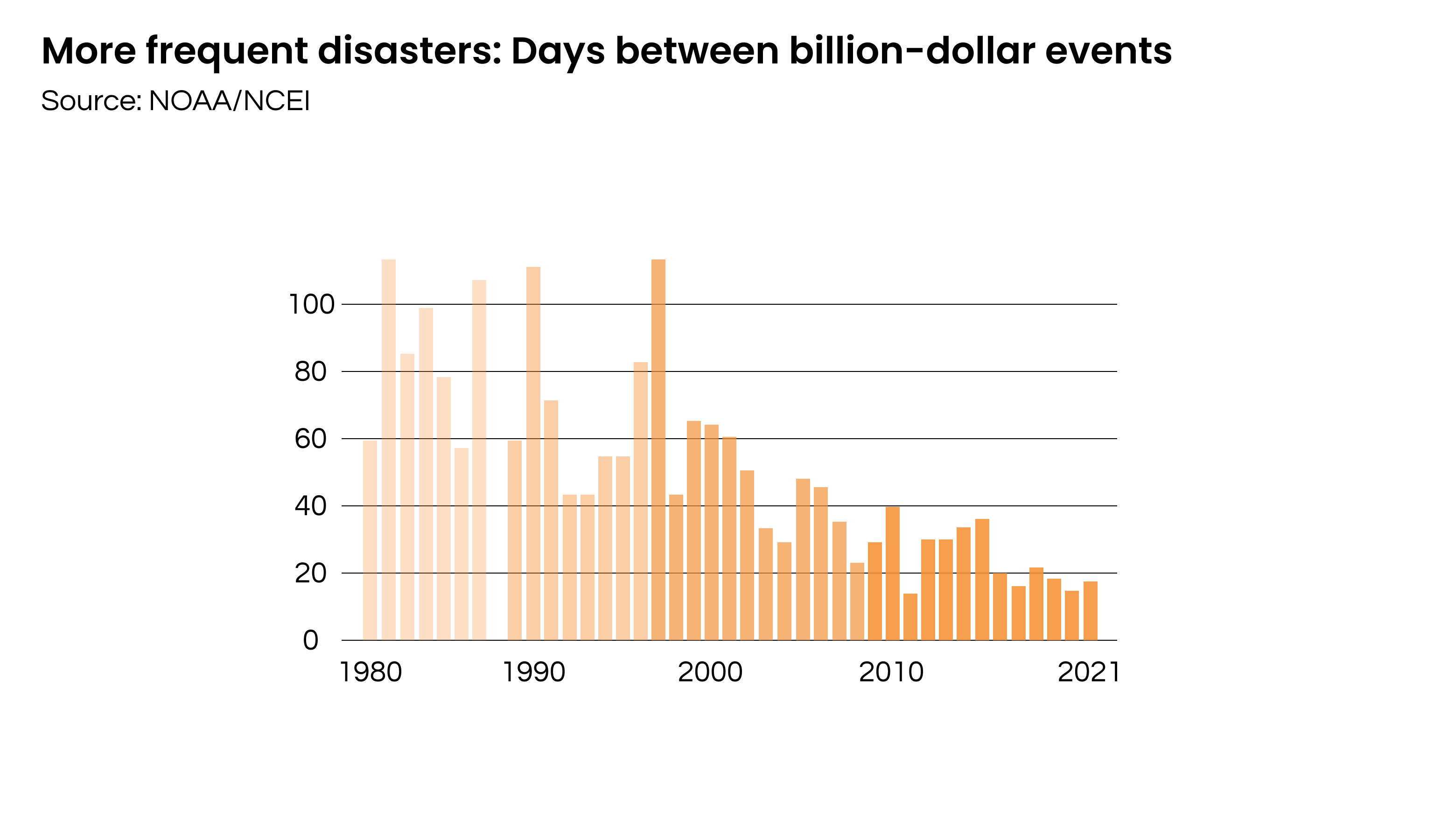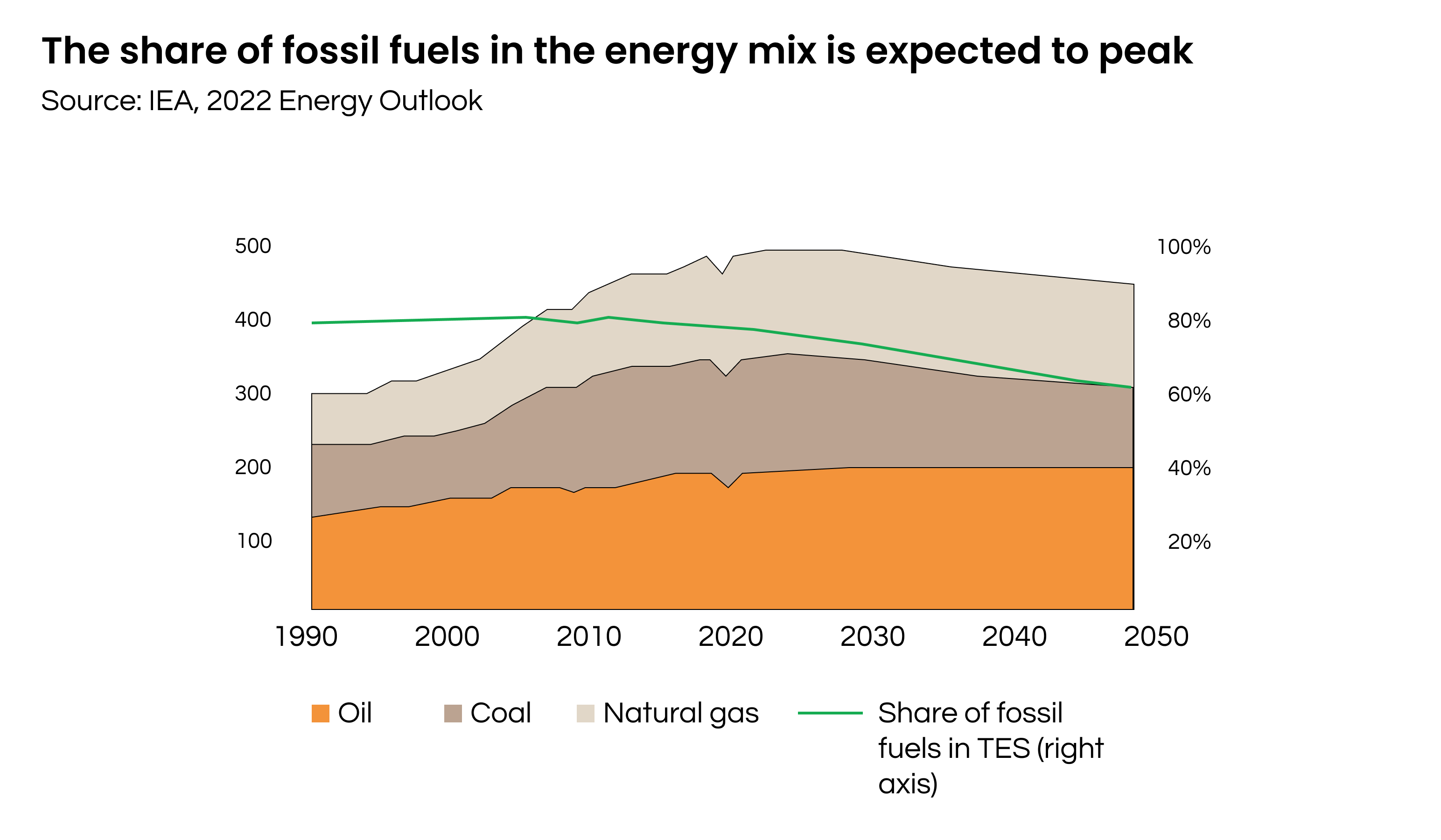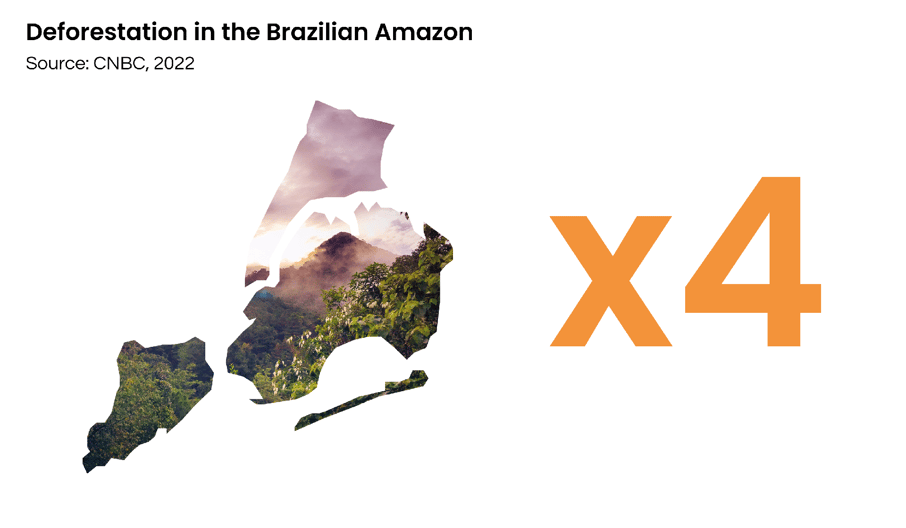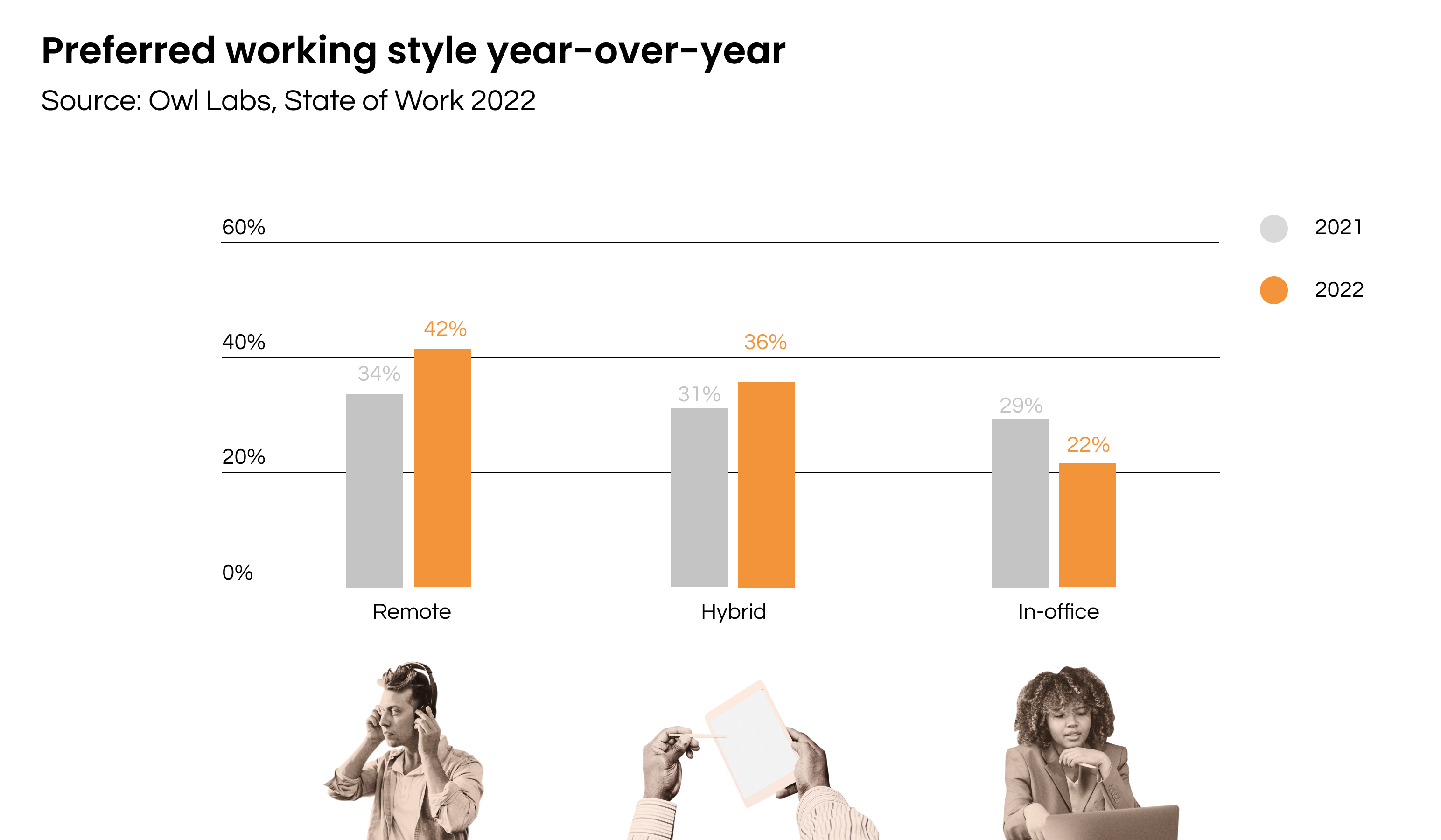It's a Wrap: 22 ESG Trends That Marked 2022
-Dec-14-2022-02-46-30-9390-PM-1.png)
The list is long, so let’s dive right into the top 22 trends that marked this year.
1. Climate change is already here
The effects of climate change were bolder than countries' commitments this year. Globally, the costs for weather-related disasters are estimated to be around $ 29 billion (Aon).
With 2022 global temperatures, the last eight years are on track to be the warmest on record.
Global temperatures are rising and the 1.5°C pathway is rapidly becoming utopistic. In 2022, the global average temperature is estimated to be about 1.15°C above the 1850-1900 average (World Meteorological Organization).

2. Mitigation and adaptation go hand in hand
Increasing global temperatures hinder the potential of climate adaptation. However, investing in climate adaptation is crucial to support countries that are already dealing with the impacts of climate change.
In 2022, many countries witnessed the above. Oftentimes, who’s suffering the most are developing nations, which also happen to be the least contributors to global warming.
Hence, the need to carry out investments to effectively adapt to climate change while also preparing for future impacts.
3. It’s time to turn net zero pledges into concrete climate action
In 2022 the Parties gathered in Sharm El Sheikh, Egypt, to discuss the latest climate change updates and strategies.
COP27 has been put forth as the place to move from discussion to action. To find out more about what was achieved during the latest climate summit, you can read our article here.
4. The European Central Bank will give companies climate scores when buying bonds
To support the EU reaching its climate ambitions, the European Central Bank (ECB) announced it would give corporations climate scores before landing them money.
The scores are based on:
- The progress made in reducing past emissions;
- The plans for future reductions;
- The level of carbon disclosure.
Through this programme, the ECB aims to support organisations that are effectively engaged in climate action by offering finance at lower interest rates.
5. ESG investing experienced major growth but not without challenges
Global ESG assets account for about $41 trillion in 2022 (Bloomberg).
The demand from investors for sustainable investment funds is growing at a rapid pace. The main challenge concerns the fear of greenwashing in companies' claims.
6. Stronger climate disclosure requirements
Organisations are backing up financial disclosure with information concerning their sustainability performance.
With organisations being asked to take responsibility for the impacts generated through their activities, climate disclosure is gaining momentum.
According to the Task Force on Climate-related Financial Disclosure (TCFD), the percentage of companies disclosing their impacts is growing.
To ensure the quality of information, the ISO Standards launched Net Zero Guidelines at COP27. The guidelines offer a common ground to disclose the progress towards net zero at corporate and country levels.
To enhance transparency on climate performance, Google Stock even started to list organisations’ CDP scores next to traditional financial metrics. By adding CDP scores in the Market Summary, Google allows everyone to learn how organisations rank.
7. Getting ready to comply with the new CSRD
The new Corporate Sustainability Reporting Directive (CSRD) has been finally approved by the European Parliament and EU Council in 2022.
The new standard, aiming to improve the quality of non-financial disclosure, will be adopted by the Commission by June 2023.
To make sure you’re ready to properly disclose your progress, you can take a look at our guide here.
8. The state of carbon markets
Carbon offsets allow countries or organisations to compensate for the emissions they’ve generated.
On the one hand, private markets are expanding with private actors exchanging carbon credits.
On the other hand, countries are far from achieving a global agreement to trade carbon offsets between each other.
9. Renewables are growing with the prediction from IEA for fossil fuels to peak in the 2030s
The global energy crises could mark the switch towards a more sustainable and secure energy system (IEA’s World Energy Outlook).
For the first time, in the 2022 World Energy Outlook, IEA predicts fossil fuels’ share in the global energy mix to move from 80% to 70% in the 2030s.

10. EU agrees stricter rules for GHG emission cuts
The European Union reached an agreement to achieve more ambitious climate targets. Particularly, the new deal (Effort Sharing Regulation – ESR):
- Requires member states to align with a stricter greenhouse gas emissions reduction trajectory;
- Sets limits to transfer, borrow and bank emission allocations;
- Increases transparency, by making available information on actions implemented by EU countries.
As a result of the new ESR, the EU must reduce GHG emissions by 40% compared to 1990 levels.
The deal poses specific attention to carbon-intensive sectors, such as:
- Road transport;
- Agriculture;
- Buildings;
- Waste management.
These sectors have been indeed subject to transformations. We share more on that in the following 2022 trends.
11. Decarbonisation of the transport industry
The transport industry is responsible for 25% of the EU’s total GHG emissions. As part of the European Green Deal, carbon emissions generated by transport will have to decrease by 90% by 2050.
In line with this goal, the European Commission has recently approved a ban on short domestic flights across France.
France proposed the ban for air-travels between destinations reachable by train within less than two-and-a-half hours. The now-approved limitation is expected to be implemented early next year.
Additionally, electric vehicles play a crucial role in the decarbonisation of the transport sector.
12. Electric vehicles are about to become the new normal
Electric vehicles (EVs) produce between 73% and 89% less pollution than diesel and petrol vehicles. Hence, their potential in driving the decarbonisation of the transport sector.
Despite the growth in EVs sales, there are still some hindrances stopping the trend to take off:
- High purchase costs of EVs;
- Limited charging infrastructure;
- Concerns about EVs' autonomy and the distance one can travel on a single charge.
However, EVs are expected to become the new normal as part of countries' plans to decarbonise the transport industry:
- The EU Parliament passed a ban on sales of new petrol and diesel cars by 2035;
- China aims to have 40% of vehicles sold in the country electric by 2030.
13. Rethinking the agricultural sector
According to FAO research, 1/3 of human-generated GHG emissions can be traced back to the agri-food industry.
Moreover, 70% of EU soils are unhealthy. This means that we are losing soil's potential to store carbon.
Hence, the need to rethink how food supply chains work.
- The European Union adopted the Farm to Fork strategy to ease the transition to a sustainable food system. Particularly, the EU aims to achieve by 2030:
- 20% reduction in the use of fertilisers;
- 50% reduction in the use of chemical pesticides;
- At least halve the loss of soil nutrients.
- The European Union is working on a regulatory framework to certify the sequestration of CO2 in soils;
- Big corporations in the Food & Beverage industry, such as Nestle and PepsiCo, pledged to source stables from farmers using regenerative practices.
14. The first steps towards lab-cultivated meat
In 2022, the Food & Drug Administration (FDA) ensured that lab-grown meat is risk-free for human health.
Achieving regulatory approval is a significant milestone that until now was obtained only by Good Meat in Singapore in 2020.
This development can contribute to the fight against climate change by offering a more sustainable alternative to the traditional livestock industry.
15. No Plan(et) B: restoring and protecting Earth’s ecosystems
Attention to protecting our planet is growing. The restoration of natural ecosystems is not only necessary to face climate crises. It is also convenient from an economic point of view.
The United Nations estimates that every $1 spent on ecosystem restoration will result in $3-$75 of economic value.
Additionally, more than ½ of the world’s economic output is strongly dependent on nature.
We’ve written an article on what to expect from the Conference on Biodiversity held in December. You can read it here.
16. Protecting Earth’s lungs
The first half of 2022 was scarred by record-breaking deforestation in the Brazilian Amazon. Between January and June, 1,500 square miles of forest have been destroyed. This is comparable to four times the size of New York City.
On a positive note, the EU has agreed on a ban on imports of products that cause deforestation. Commodities that fall in the scope are:
- Palm oil;
- Cocoa;
- Coffee;
- Timber;
- Rubber.
Also, during COP27 world leaders launched the Forests and Climate Leaders’ Partnership (FCLP) to:
- Enhance international collaboration on supply chains;
- Support Indigenous people and local communities;
- Develop further carbon markets for forests;
- Encourage the preservation of high-integrity forests.

17. Reversing coral bleaching and restoring ocean carbon sinks
Coral reefs are one of the many tipping points that can determine the outcome of the climate crisis.
The Red Sea reefs seem to be amongst the most resilient on Earth. That is why during COP27, 15 million dollars have been directed towards the restoration and protection of Egyptian corals.
After all, the results of some restoration activities prove that there is hope to bring marine ecosystems back to life. In 2022, the Australian Institute of Marine Sciences (AIMS) identified the highest coral cover in 36 years of monitoring along the Australian Great Barrier Reef.
18. Global Plastic Treaty
In March 2022, the United Nations agreed on the development of a global treaty to tackle plastic pollution.
The international legally binding agreement is expected to be finalised by 2024. The goal is to reduce waste and boost circularity. This could:
- Reduce the volume of plastics polluting our oceans by over 80% by 2040;
- Reduce plastic production by 55%;
- Reduce GHG emissions by 25%.
Within the European Union, the Commission proposed new rules on packaging in November 2022. The goal is to reduce the amount of waste generated by the packaging industry.
19. A bold move to protect our planet: Patagonia
In 2022, Y. Chouinard, founder of the outdoor apparel company Patagonia, takes a bold move to safeguard the planet.
Chouinard has donated the company to a non-profit organisation to make sure that all its profits are used to halt climate change and protect our planet’s land.
20. Common measures to halt forced labour
The International Labour Organisation (ILO) claims that over 27 million people are subject to forced labour in 2021.
Last September, the European Commission proposed to ban the sale of products made with forced labour within the EU market.
This move is part of the wider ambition to promote a Just Transition that guarantees social inclusion and human rights protection.
21. Working from home continues beyond the pandemic
Remote working started as a drastic and inevitable measure during the COVID-19 pandemic. However, statistics suggest that working from home is here to stay.
In 2022, 56% of companies in the world allow remote working at least partially.
Based on research, employees seem to highly value flexibility at work:
- The number of workers opting for remote working increased by 24% in 2022, compared to 2021;
- Employees choosing hybrid work grew by 16%;
- The interest in working from the office decreased by 24%.

22. Young people get a voice in the climate fight
Younger generations will face the consequences of climate change on the front line.
After years of activism and demonstrations, young people finally managed to claim their space at COP27 in the Youth and Children Pavilion. Here, they got involved in policymaking and empowered to be part of the climate fight.
Now it’s time to turn towards 2023 carrying with us the main learnings from the past year. We look forward to a new year of bold action for a more just and sustainable future.
